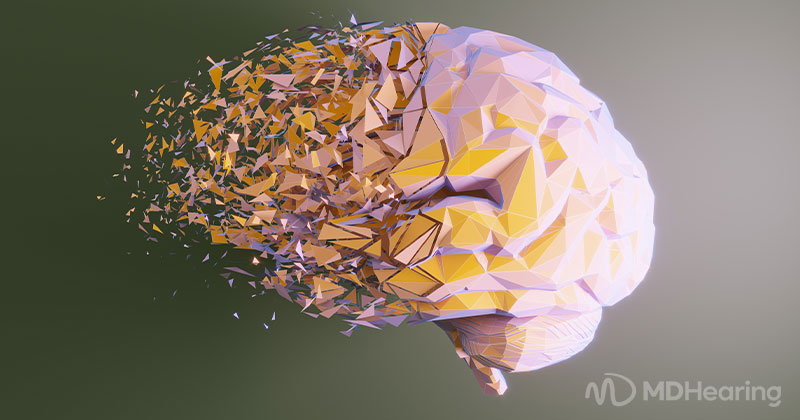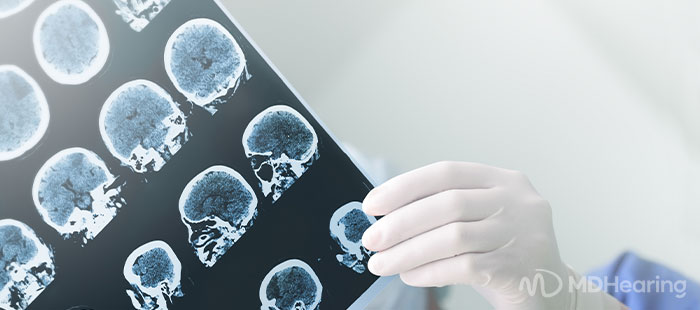New research related to combating cognitive decline seems to come out every day. You may have already heard that solving puzzles and brain teasers helps you stay mentally sharp and alert, eating leafy greens and whole grains helps fight dementia, or exercising regularly increases blood flow to the brain.
But did you know that there are links between hearing loss and cognitive decline, namely forms of dementia such as Alzheimer’s?
According to the Journal of the American Medical Association, people with mild hearing loss have nearly twice the risk of developing dementia compared to those with normal hearing. This risk increased threefold for people with moderate loss and fivefold for those with severe loss.
So, could improving hearing reduce the risk of a person developing Alzheimer’s? Researchers are investigating the connection between hearing loss and dementia, and answers could be just around the corner.
What Is Alzheimer’s?
Alzheimer's disease—the most common form of dementia—affects an estimated 6.5 million Americans age 65 and older.
While dementia and Alzheimer’s disease are often used interchangeably, they’re not actually the same thing. Dementia is not a specific disease, but rather a general term for a group of symptoms that are severe enough to impact your quality of life. Some other types of dementia are vascular dementia, Parkinson’s disease, or alcohol-related dementia.
Alzheimer’s disease, however, is a disease of the brain. Common symptoms include forgetfulness, impaired thinking, personality changes, and difficulty making decisions.
Currently, there is no cure for Alzheimer’s, but you can treat and help slow down mild cognitive impairment if caught early. Some treatments may help to change disease progression.
There is anecdotal evidence that natural remedies provide therapeutic benefits for Alzheimer's, but because these alternative treatments aren't regulated by the Food and Drug Administration (FDA), there are concerns about their efficacy and safety.
Alzheimer’s or Untreated Hearing Loss?
What may appear to be dementia or Alzheimer’s disease could actually be untreated hearing loss. Both hearing loss and Alzheimer’s can affect communication, and they share many of the same symptoms, such as depression and anxiety, paranoia, or denial.
People with Alzheimer’s can also experience difficulties such as struggling to understand speech or finding the right word for what they want to say. They may have problems processing what they’ve heard, particularly if there are distractions.
Due to the similarities in symptoms of hearing loss and Alzheimer’s, one may be mistaken for the other, making diagnosis difficult. Because of this, routine hearing tests are crucial when it comes to preventative health care for Alzheimer’s.
What’s the Connection Between Hearing Loss and Alzheimer’s?
A 2013 study looked at cognitive impairment scores over six years for nearly 2,000 older adults. They found that those with hearing loss had a faster cognitive decline. At the beginning of the study, participants were cognitively normal. But by the end, those with hearing loss had a 24% increased risk of developing cognitive impairment compared to people who experience hearing within normal limits.
Most recently, research in 2021 found that people who struggle to hear speech in noise were more likely to develop dementia than those with hearing within normal limits.
Research clearly shows a connection between hearing loss and Alzheimer's. But does hearing loss actually cause Alzheimer’s, or vice versa? The answer to this question is currently unclear, though some theories about the connection exist.
Changes in the Brain Due to Hearing Loss
Studies show that when we stop using the part of the brain responsible for hearing, changes in the brain structure and tissue loss occur. These parts of the brain seemingly shrink—a possible link to the effects of Alzheimer’s.
Hearing Loss and Social Isolation
Hearing loss can contribute to social isolation, increasing the risk of dementia.
People with hearing loss may withdraw from socializing due to communication difficulties. Being less socially engaged means the brain is less stimulated, increasing the risk of cognitive decline and Alzheimer’s.
Hearing Loss and Cognitive Load
Struggling to hear all the time can take its toll on the brain. For people with hearing loss, the brain has to work hard to process sound and make sense of conversation. The extra energy needed to hear can be at the expense of other cognitive processes, such as memory, decision-making, and reasoning. This “brain overload” could increase the risk of Alzheimer’s and other cognitive disorders.
A Shared Cause
It could be possible that hearing loss and dementia might share a common cause.
Certain types of dementia, specifically vascular dementia, are caused by reduced blood flow to the brain. A rich supply of blood flow is not only essential for our cognitive health but also our hearing health. If the part of our brain that processes sound (our auditory system) doesn't receive sufficient blood supply, this can impact our hearing.
Reducing the Risks of Alzheimer’s
There is strong evidence that you can reduce the risk of developing Alzheimer’s through lifestyle choices. Eating a healthy diet, exercising, and staying socially connected can all go towards taking care of your cognitive health.
Can Hearing Aids Delay or Reduce the Risk of Alzheimer’s?
So, the big question is: Can hearing aids help prevent Alzheimer’s?
Various research shows that hearing aids help maintain connections with others while improving your hearing. They can also preserve your emotional and physical health, and keep your brain active.
However, researchers are presently not sure whether hearing aids can prevent or reverse cognitive decline. Studies are underway to get some definite answers on this subject.
The National Institute on Aging is currently funding research to see whether older adults who use hearing aids are less likely to develop dementia than those who don’t. By early 2023, the results of this study should provide more clarity on whether treating hearing loss with hearing aids will reduce the risk of cognitive decline and dementia.
Final Thoughts
It’s safe to say when it comes to maintaining your cognitive health as you get older, taking care of your hearing can help. Not only do hearing aids help you communicate and avoid social isolation, but they keep your brain active and healthy, too.
MDHearing's high-quality, FDA-registered hearing aids accommodate mild to moderately-severe loss (addressing 94% of individuals with hearing loss) and come with a 100% money-back guarantee.
Start by taking the free online hearing test from MDHearing. It only takes 8 minutes to complete and you will receive immediate results with personalized information about your hearing. Once you're finished, MDHearing’s on-staff licensed hearing professionals will be available to discuss your results and walk you through the best options for your needs.
Want to see if MDHearing hearing aids will work for you? Take our quick and easy online hearing test now.
TAKE ONLINE HEARING TEST


